This week, read about two behaviors that blunt the influence of fatty meals on vascular health, research that challenges ice for treating muscle injuries, air pollution and exercise, how bike lanes & shared streets pay for themselves, new studies that question the benefits of fish oil supplements, Easter cooking ideas, and more.
Fatty Meals Impair Vascular Health
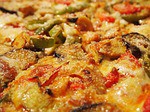 The health consequences of eating a fatty meal can be immediate. Foods high in fat, especially saturated fat, tend to impair blood vessel function temporarily (until the fat clears your blood). Researchers have used this phenomenon to find strategies that reduce this harmful response, because this vascular dysfunction might predispose people to coronary plaques and lesions that increase the risk of heart disease. Two studies published this week suggest two behaviors that can lessen the damage of a high-fat meal: exercise and eating peanuts. Much research has already shown that these behaviors can reduce the risk of heart disease. You’d be better off limiting meals with high levels of unhealthy fats in the first place, but these new studies provide insight into how these behaviors might be protective.
The health consequences of eating a fatty meal can be immediate. Foods high in fat, especially saturated fat, tend to impair blood vessel function temporarily (until the fat clears your blood). Researchers have used this phenomenon to find strategies that reduce this harmful response, because this vascular dysfunction might predispose people to coronary plaques and lesions that increase the risk of heart disease. Two studies published this week suggest two behaviors that can lessen the damage of a high-fat meal: exercise and eating peanuts. Much research has already shown that these behaviors can reduce the risk of heart disease. You’d be better off limiting meals with high levels of unhealthy fats in the first place, but these new studies provide insight into how these behaviors might be protective.
Short bouts of high-intensity exercise before a fatty meal best for vascular health. Earlier research found that exercise can protect blood vessels from the harmful effects of a high-fat meal. This study compared moderate intensity cycling (25 min) to high intensity cycling (8 x 1-min intervals) before consumption of a high-fat milkshake made with ice cream and double cream. Investigators found that the high intensity exercise improved blood vessel function more than moderate exercise. Researchers studied young adolescents, since this is the period that blood vessel health begins to deteriorate, often because of lifestyle habits. (American Journal of Physiology – Heart and Circulatory Physiology, March 2015).
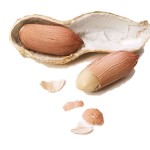 Peanut consumption benefits vascular function. In this study, researchers investigated the influence of including peanuts in a high-fat meal. They compared blood vessel response in overweight males after consuming two different high fat shakes: a control shake and shake containing 3 oz. of peanuts (both shakes had the same amount of fat, carbohydrates, and protein). Researchers found that participants consuming the peanut-containing shake had normal blood vessel function, while those consuming the control shake had impaired blood vessel function, suggesting that peanuts were somehow protective. (Experimental Biology 2015). Peanuts have been in the news for their heart benefits lately: in a study published earlier this month, Harvard researchers found that peanut intake was linked to heart health.
Peanut consumption benefits vascular function. In this study, researchers investigated the influence of including peanuts in a high-fat meal. They compared blood vessel response in overweight males after consuming two different high fat shakes: a control shake and shake containing 3 oz. of peanuts (both shakes had the same amount of fat, carbohydrates, and protein). Researchers found that participants consuming the peanut-containing shake had normal blood vessel function, while those consuming the control shake had impaired blood vessel function, suggesting that peanuts were somehow protective. (Experimental Biology 2015). Peanuts have been in the news for their heart benefits lately: in a study published earlier this month, Harvard researchers found that peanut intake was linked to heart health.
Other Links of Interest This Week
How Bike Lanes & Shared Streets Pay for Themselves, and Then Some. A new report shows that Complete Streets (carefully designed streets for all road users, not only motorists) are worth a city’s time and resources (PhillyMag reporting on Safer Streets, Stronger Economies)
More research challenges practice of ice for muscle injuries. A new study presented at the Experimental Biology Meeting this week shows the importance of inflammation for tissue regeneration, and questions that practice of icing injuries. The study was conducted in mice. An earlier summary of 22 studies found no evidence that ice helped healing.
“Shaky Science” Doubts Saturated Fat Linked to Heart Disease. Although headlines have touted “Butter is Back,” a thorough look at the research shows that limiting saturated fats is sill a good idea for health. Center for Science in the Public Interest interviews Martijn Katan, a world-renowned expert on diet and cardiovascular disease, who clarifies the research, fat recommendations, and talks about the dairy industry’s well-funded campaign to prove saturated fat doesn’t cause heart disease to improve the image of milk fat.
 A French blogger perfectly captured the ridiculousness of the gluten-free craze. Although most experts don’t support the claim that gluten-free diets are what’s best for everyone, the fad of avoiding this grain protein is still evident. The Gluten Free Museum highlights the silliness of this trend, with “gluten-free” classic paintings and pop culture scenes. (Vox.com)
A French blogger perfectly captured the ridiculousness of the gluten-free craze. Although most experts don’t support the claim that gluten-free diets are what’s best for everyone, the fad of avoiding this grain protein is still evident. The Gluten Free Museum highlights the silliness of this trend, with “gluten-free” classic paintings and pop culture scenes. (Vox.com)
Air pollution is no barrier to exercise. The long-term health benefits of physical activity outweigh the risks of exercising in a polluted environment. (Environmental Health Perspectives).
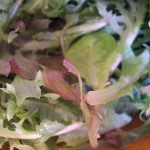 The colour of lettuce determines the speed of its antioxidant effect. Salad greens have many health benefits, and they are rich in antioxidants. A new study found that the colour of lettuce leaves determines the speed at which the antioxidant compounds act (green leaves have antioxidants that react more slowly, while red-leaf ones have a faster effect). Mixing different types of lettuce makes a great tasting and visually appealing salad – it might also influence antioxidant activity in our body. (Journal of Agricultural and Food Chemistry).
The colour of lettuce determines the speed of its antioxidant effect. Salad greens have many health benefits, and they are rich in antioxidants. A new study found that the colour of lettuce leaves determines the speed at which the antioxidant compounds act (green leaves have antioxidants that react more slowly, while red-leaf ones have a faster effect). Mixing different types of lettuce makes a great tasting and visually appealing salad – it might also influence antioxidant activity in our body. (Journal of Agricultural and Food Chemistry).
10 cancers now linked to excess body fat. A growing body of research is linking being overweight to cancer risk. The World Cancer Research Fund explains how being overweight increases cancer risk, because excess body fat
- influences levels of circulating hormones implicated in cancer (insulin, insulin-like growth factors and estrogen)
- increases risk for type 2 diabetes, associated with increased risk of some cancers
- stimulates the body’s inflammatory response, implicated in cancer development and progression
Given that 7/10 Americans and 6/10 Canadians are overweight or obese, and the health consequences go beyond cancer, public health efforts to reduce obesity are critical. Losing weight is challenging, but best to ignore fad diets and follow evidence-based advice.
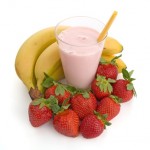 Should you drink smoothies? 3/5 experts say yes. The benefits are that smoothies are a good way to increase fruit intake (and you can also add veggies). The downside is that, depending on your recipe, you might consume too much sugar that’s absorbed at a quick rate, and too many calories (liquids are less satiating than solid foods). (Time) For athletes, a great time for smoothies is when you need the calories and sugar – after a hard workout.
Should you drink smoothies? 3/5 experts say yes. The benefits are that smoothies are a good way to increase fruit intake (and you can also add veggies). The downside is that, depending on your recipe, you might consume too much sugar that’s absorbed at a quick rate, and too many calories (liquids are less satiating than solid foods). (Time) For athletes, a great time for smoothies is when you need the calories and sugar – after a hard workout.
Exercise largely absent from U.S. medical school curriculum, study shows. Despite the indisputable health benefits of exercise, most medical students receive little education on the topic. (Oregon State University).
Physical activity education is not the only lifestyle behavior lacking. As I’ve noted previously, most medical students receive very little, if any, nutrition education. In this article, a 2nd year medical student at Harvard Medical School reports on the his mere 9 hours of nutrition education, which is similar (or even better) to other schools. Given that physical activity and nutrition play a critical role in heart disease, diabetes, other chronic diseases, there is much room for improvement in the medical school curriculum.
Fish Oil Supplement Claims Not Supported by Research. Fish oil is a popular supplement, as early studies suggested benefits for cardiovascular health, and its use is endorsed by groups such as the American Heart Association. Newer and more rigorous studies are questioning the benefits of fish oil for cardiovascular health. (New York Times)
Should We Tax Unhealthy Foods? An argument for taxing less nutritious foods to subsidize the nourishing ones, as education and knowledge alone have done little to curb obesity. (Tufts Now)
Easter Weekend Cooking!
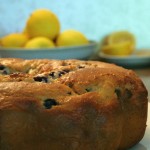 For those of you celebrating Easter weekend with some festive gatherings or egg hunts, here are some tips and recipe ideas . . .
For those of you celebrating Easter weekend with some festive gatherings or egg hunts, here are some tips and recipe ideas . . .
Lemon Blueberry Cake. This lemony cake celebrates spring, so I”ll be making is this weekend. It’s one of my favourite cakes, featuring lemons and blueberries, a terrific combination. Although it is rich-tasting, it is much healthier than traditional lemon cakes.
Baked Mediterranean Frittata. This frittata makes a healthy breakfast or brunch. It’s a nutritious dish that looks and tastes great, and it is rich in vegetables and good quality protein.
How to cook hard-boiled eggs so they are easy to peel (Science Friday)
Share This: